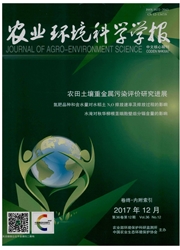

 中文摘要:
中文摘要:
水分管理是影响稻田甲烷(CH4)产生、氧化与排放的重要因素之一。根据国内外文献资料,综述了非水稻生长期和水稻生长期水分管理对稻田CH4产生排放的影响,以及非水稻生长期水分管理对水稻生长期CH4产生排放的影响,并提出有待研究的内容。综合多年的研究结果表明,冬季淹水不仅引起冬季(非水稻生长期)CH4的大量排放,还影响水稻生长期CH4排放量。非水稻生长期土壤水分含量越高,随后水稻生长期CH4排放量越大,产生和氧化能力越强。水稻生长期烤田相对于持续淹水能大量减少CH4排放。
 英文摘要:
英文摘要:
Water regime management is one of the factors affecting methane(CH4)generation, oxidation, and emission of rice paddy fields. Flooding of the paddy field in winter causes high CH4 emission not only during the non-rice growing season, i. e. winter, but also during the rice growing season to follow. The higher the soil moisture content in the non-rice growing season, the higher CH4 emission, and the stronger CH4 production and oxidation capacities of the soil during the rice growing season. The effect of water regime management during the non- rice growing season on CH4 emission during rice growth season was attributed to water content affecting methanotroph and methanogenesis. Drying rice paddy fields in sunshine or plantation of wheat in winter could profoundly reduce CH4 emission from long flooded paddy fields. Also, CH4 emission could be sharply decreased by midseason aeration during rice growing period. In this paper a review is presented to sum- marize the effect of water regime management during the non-rice and rice growing seasons on CH4 emission from the soils and the effect of water regime management during the non-rice growing season on CH4 emission during the rice growing season, and issues that need further studying are also put forward.
 同期刊论文项目
同期刊论文项目
 同项目期刊论文
同项目期刊论文
 Phosphorus enhances Al resistance in Al-resistant Lespedeza bicolor but not in Al-sensitive L. cunea
Phosphorus enhances Al resistance in Al-resistant Lespedeza bicolor but not in Al-sensitive L. cunea Hexachlorobenzene dechlorination as affected by organic fertilizer and urea applications in two rice
Hexachlorobenzene dechlorination as affected by organic fertilizer and urea applications in two rice Enhanced removal of polychlorinated biphenyls from alfalfa rhizosphere soil i a field study: the imp
Enhanced removal of polychlorinated biphenyls from alfalfa rhizosphere soil i a field study: the imp Influence of arbuscular mycorrhiza and rhizobium on phytoremediation by alfalfa of an agricultural s
Influence of arbuscular mycorrhiza and rhizobium on phytoremediation by alfalfa of an agricultural s Ammonium under solution culture alleviates aluminum toxicity in rice and reduces aluminum accumulati
Ammonium under solution culture alleviates aluminum toxicity in rice and reduces aluminum accumulati Effects of soil moisture, temperature, and nitrogen fertilization on soil respiration and nitrous ox
Effects of soil moisture, temperature, and nitrogen fertilization on soil respiration and nitrous ox Landscape analysis of dynamic soil erosion in subtropical China : a case study in Xingguo County , J
Landscape analysis of dynamic soil erosion in subtropical China : a case study in Xingguo County , J Methane and nitrous oxide emissions from rice paddy soil as influenced by timing of application of h
Methane and nitrous oxide emissions from rice paddy soil as influenced by timing of application of h Global estimations of the inventory and mitigation potential of methane emissions from rice cultivat
Global estimations of the inventory and mitigation potential of methane emissions from rice cultivat Quantifying methane emissions from rice fields in Taihu Lake region, China by coupling detailed soil
Quantifying methane emissions from rice fields in Taihu Lake region, China by coupling detailed soil Organochlorine Pesticides (OCPs) in Soils under different land usage in the Taihu Lake Region, P. R.
Organochlorine Pesticides (OCPs) in Soils under different land usage in the Taihu Lake Region, P. R. Short-term effects of wheat straw incorporation into paddy field as affected by rice transplanting t
Short-term effects of wheat straw incorporation into paddy field as affected by rice transplanting t Root phosphate exudation and pH shift in the rhizosphere are not responsible for aluminum resistance
Root phosphate exudation and pH shift in the rhizosphere are not responsible for aluminum resistance Uncertainty assessment of mapping mercury contaminated soils of a rapidly industrializing city in th
Uncertainty assessment of mapping mercury contaminated soils of a rapidly industrializing city in th Number of soil profiles needed to give a reliable overall estimate of soil organic carbon storage us
Number of soil profiles needed to give a reliable overall estimate of soil organic carbon storage us 期刊信息
期刊信息
